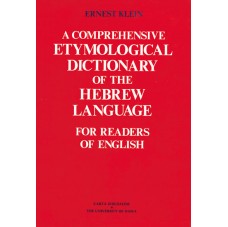14 other products in the same category:
-

The Book of...
$72.00
View
-

Echoes From...
$98.00
View
-

Bound For Exile
$64.00
View
-

Understandin...
$19.95
View
-

Dictionary...
$24.95
View
-

Hebrew...
$19.95
View
-

Parables of...
$84.00
View
-

Carta’s...
$19.95
View
-

Alphabets...
$19.95
View
-

The...
$7.99
View
-

The World’s...
$84.00
View
-

A-dventure-Z
$22.50
View
-

THE NATIONAL...
$99.95
View
-

Visual...
$40.00
View
By: Ernest Klein
A concise work on the origins of Hebrew words and their sense development.
Hard Cover, 721 pages, 8 x 12 in. (20 x 30 cm)
ISBN: 965-220-093-X
Weight: 2.10 kg (70.9 oz)
====================================
Ernest David Klein (1899-1983)
was bom in Szatmar in the eastern part of the Austro-Hungarian Empire (now Romania). In 1925 he earned the title of Doctor of Philosophy at the University of Vienna. His specialized fields were Semitic languages and literature, Romance languages and literature, and Philosophy.
In 1931 he became Rabbi of Nove Zamke in the former Czechoslovakia. Here he remained until deported by the Nazis in World War II, first to Auschwitz and later to the concentration camp Allach-Dachau. He was liberated by American troops in 1945. His father, wife, only son and two of his three sisters had perished in the extermination camps. After the Holocaust he returned to his birthplace, but shortly afterwards he went to Paris, and finally moved to Canada in 1951. Here he was able to devote himself to the projects he had started earlier in Europe.
For the next twenty years Dr. Klein devoted himself to the study of the history of the English language. Since English has roots in some forty spoken and extinct languages, and Klein had mastered these languages, he was uniquely qualified to compile his comprehensive etymological dictionary of the English language, which was the most exhaustive of its kind at the time. The next ten years of his life he devoted to:
A COMPREHENSIVE ETYMOLOGICAL DICTIONARY OF THE HEBREW LANGUAGE FOR READERS OF ENGLISH
“Klein’s is the first etymological dictionary in the proper sense of Hebrew as a totality.... It applies the sound-laws with great strictness and discusses cases where there are doubts, or where more than one etymology has been suggested.”
Haim Rabin Hebrew University
This is an exceptionally valuable tool for all who work with Hebrew, even those with a minimal knowledge of the language. For here are detailed etymologies of some 30,000 words and word forms—in an easy-to- use volume unique in scope and authority.
Prepared by the eminent language scholar and lexicographer Ernest Klein, this is a rich compendium of knowledge about the origin, derivation, and variations of most Hebrew words, it traces the history of the language by identifying the way its vocabulary has changed, in meaning and in usage, over the centuries.
In this dictionary, the vocabulary of present-day Hebrew is covered thoroughly; also here are the Biblical, Mishnaic, and Rabbinic words that inform today's language, as well as medieval words used in earlier periods but no longer in current use. Klein identifies borrowed or cognate words from Akkadian, Aramaic, Greek, Arabic and the other languages that have enriched the Hebrew vocabulary.
Each entry term includes a clear, concise, specific definition, as well as the part of speech or linguistic stratum from which it comes. The various meanings of the entry term are listed and numbered consecutively. Set off in brackets for easy identification is the etymological information for each entry; then follow the derivatives, most of which appear as separate entries in the book.
The dictionary features many useful aids to research, including guides for the translation of Greek, Hebrew, and Arabic; and complete guides to abbreviations, symbols and reference sources used in the book. With the exception of Hebrew terms, the book is in English; cognate and source words from other languages are transliterated and translated into English.
Because of its wide scope and its meticulous scholarship, this is a much-needed reference tool, ft will be valuable for students, teachers, scholars, and general readers and writers of Hebrew and its literature; for those in Biblical, Judaic, and Near Eastern studies, as well as students of conparative literature, historical linguistics and semantics, and many other fields of study. For those who have a love for this constantly developing language, the dictionary will be a source of information and insight.
Shopping Cart
Categories
-
Bible Studies
- Battles
- Bible History
- Biblical Judges
- Biblical Prophets
- Digital
- Divided Kingdom
- Exodus and Conquest of Canaan
- Herodian period
- Historical Geography
- Introductory Maps
- Jerusalem
- Jesus
- Kingdom of Judah
- Kings
- New Testament
- Old Testament
- Patriarchs
- Bible Wall Maps & Charts
- The United Monarchy
- Tribes of Israel
- Religion
- Christianity
-
History
- Archaeology
- Bible History
- Jerusalem
- New Testament
- Old Testament
- Tribes of Israel
- History
- Assyrian Empire
- Babylonian Empire
- Bar Kokhba revolt
- Battles
- Bronze Age
- Canaanite Period
- Divided Kingdom
- Early Bronze Age
- Exodus and Conquest of Canaan
- Greek Empire
- Hasmoneans
- Hellenistic period
- Herodian period
- Introductory Maps
- Iron Age
- Israel and Judah
- Jewish Revolt against the Romans
- Kingdom of Judah
- Maccabees
- Persian Empire
- Roman Conquest
- The United Monarchy
- Islam
- Israel Guides
- Religion
- Wall Maps & Charts
- Middle Ages
- Israelite Period
- Judaism
- Historical Geography
- Understanding
- Archaeology
- Jerusalem
- Hebrew Script
- Guides & Maps
- eBooks
- New titles




